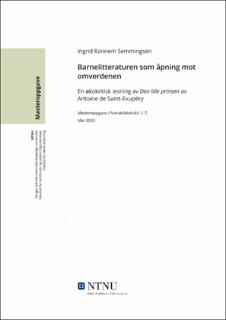| dc.contributor.advisor | Myren-Svelstad, Per Esben | |
| dc.contributor.author | Semmingsen, Ingrid Rannem | |
| dc.date.accessioned | 2021-09-28T17:45:45Z | |
| dc.date.available | 2021-09-28T17:45:45Z | |
| dc.date.issued | 2020 | |
| dc.identifier | no.ntnu:inspera:55578083:16607894 | |
| dc.identifier.uri | https://hdl.handle.net/11250/2784858 | |
| dc.description.abstract | Denne oppgaven hviler på antakelsen om at barnelitteraturen innehar en særegenhet som har potensialet til å gi oss et alternativt blikk på samtiden, og at barnelitteraturen dermed kan være en viktig inngang til omverdenen. Det norskfaglige kjerneelementet «tekst i kontekst» understreker hvordan litteraturen utfyller denne funksjonen for unge lesere. På bakgrunn av dette ønsker jeg i denne oppgaven å kaste lys over barnelitteraturens mulige rolle i møte med dagens klimautfordringer. Dette har jeg gjort ved å undersøke Den lille prinsen av Antoine de Saint-Exupéry, med det nye tverrfaglige temaet «bærekraftig utvikling» som norskdidaktisk ramme. Oppgavens problemformuleringer er derfor som følger: «På hvilken måte kan barnelitteraturen skape refleksjon om det antropocene?» og «Hvordan kan en økokritisk lesning av Den lille prinsen av Antoine de Saint-Exupéry bidra til en ivaretakelse av barnelitteraturens særegenhet i norskfaglig sammenheng?». Den skjønnlitterære analysen gjøres i et økokritisk perspektiv, som vil si at man kritisk undersøker litteraturens fremstilling av forholdet mellom det menneskelige og det ikke-menneskelige. For å gripe an bokens barnelitterære særegenheter har jeg brukt teori om barnelitteraturens historiske utvikling, samt forskning på barnelitteratur.
Den lille prinsen er en barnebok som tar for seg filosofiske og eksistensielle spørsmål gjennom et barnlig blikk på omverdenen. I undersøkelsen finner jeg at bokens ærlige og nysgjerrige barneperspektiv tilbyr leseren en nyansert forståelse av omverdenen, samtidig som vi kan lese fram en underliggende kritikk mot sivilisasjonen som har skapt det moderniserte opplysningssamfunnet. Kritikken inneholder også de voksnes lengsel tilbake til barnet og barndommen. Barneblikket avslører hvordan det egentlig ikke eksisterer et skille mellom mennesket og omgivelsene, men at de står i et gjensidig avhengighetsforhold. Dette forholdet preges av en ambivalens, som også gjennomsyrer boken som helhet. Undersøkelsen viser at boken har en tilknytning til den barnelitterære tradisjonen, samtidig som den har et potensial til å fortelle oss noe om den verdenen vi befinner oss i nå. Den økokritiske tilnærmingen til Den lille prinsens barnelitterære særtrekk eksemplifiserer hvordan vi kan reaktualisere og diskutere eldre barnelitteratur i lys av samtiden. | |
| dc.description.abstract | This thesis rests on the assumption that children’s literature possesses an idiosyncrasy which has the potential of giving us an alternative contemporary perspective, and that children’s literature thus may be an important entrance into the outside world. The Norwegian L1 subject’s core element “Text in context” emphasizes how literature fulfills this function for young readers. Based on this, I wish in this paper to shed light on the potential role children’s literature can play in meeting today’s climate challenges. This is done by examining The Little Prince by Antoine de Saint-Exupéry, with the new interdisciplinary topic “sustainable development” as a Norwegian subject didactical framework. The thesis’ research questions are therefore: “In what way can children’s literature induce reflection about the Anthropocene?” and “How can an ecocritical reading of The Little Prince by Antoine de Saint-Exupéry contribute to a preservation of the idiosyncrasy of children’s literature, in the context of the Norwegian L1 subject?”. The analysis is done in an ecocritical perspective, which means that one critically examines literature’s representation of the relationship between humans and non-humans. In order to address the children’s literary idiosyncrasy of the book, I have used theory of the historical development of children’s literature, as well as research on children’s literature.
The Little Prince is a children’s book that addresses philosophical and existential questions through a childlike perception of the world. In the study I find that the book’s honest and curious childlike viewpoint offers the reader a nuanced understanding of the outside world, while at the same time there is an underlying criticism towards the civilization which created the modern Enlightenment society. This criticism also includes the adults’ longing for childhood and being childlike. The childlike viewpoint reveals how we can’t view humans and the environment as separate entities, but that they exist in a relationship of co-dependency. This relationship is characterized by an ambivalence, which also permeates the book. The study shows how the book has a connection to the children’s literary tradition, while at the same time has the potential to tell us something about the world we are in now. The ecocritical approach to the children’s literary traits in The Little Prince exemplifies how we can discuss and make older children’s literature relevant in light of contemporary times. | |
| dc.language | | |
| dc.publisher | NTNU | |
| dc.title | Barnelitteraturen som åpning mot omverdenen: En økokritisk lesning av Den lille prinsen av Antoine de Saint-Exupéry | |
| dc.type | Master thesis | |
